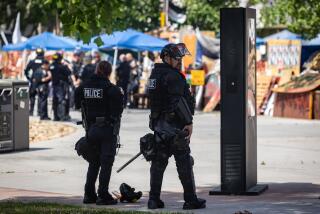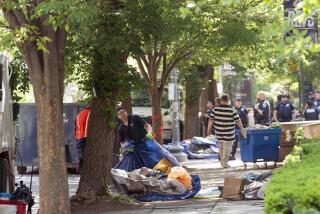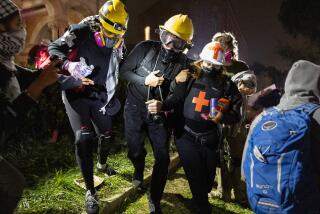Tents give way to traffic in Tahrir Square
Reporting from Cairo — The Egyptian army moved into Tahrir Square on Sunday, tearing down tents and opening the artery to traffic nearly three weeks after the start of the protests that brought an end to the 30-year reign of Hosni Mubarak.
The dozens of soldiers in olive fatigues and red berets surrounded the one remaining stage for protesters, while cars honked and drove around the city hub for the first time since Jan. 25, when people erupted in rage against Mubarak. It was a sign of the military’s determination to restore normalcy to the nation’s capital.
The 18-day popular uprising had shut down Egypt’s economy, sparked clashes and frozen activity in Cairo’s downtown, home to the government and major businesses.
Scores of soldiers fanned out into the remaining tent cities on the square and unceremoniously tore them down. The families and young people, who had been squatting, mainly complied and accepted that Tahrir Square no longer belonged to them. The soldiers dismantled the plastic tarps and walked among the papers, trash and even a child’s lost teddy bear. One teenager shoved and pushed at the soldiers and cried at having to leave.
One protester, who was evicted, warned that the army will never meet the Egyptians’ demands for greater democracy if the demonstrators surrendered Tahrir Square.
“We don’t want to leave,” said Mohammed Shaheen. “They’ll never give up the emergency laws. And they’ll use them to put people in jail.”
As the campers watched the army clear the square, a parade of police and ordinary Egyptians materialized like a flash flood. The cops in blue sweaters and berets were raised on people’s shoulders and waved Egyptian flags.
“The Police and Army are one,” they chanted. The policeman pumped their fists and converged with the protesters’ stage. “God is Great, God is Great,” the two groups roared, while cars beeped and inched forward, as if nothing unusual had happened.
Some erupted in anger at the police. One young man tried to charge them. “The police killed us! Don’t believe them,” he shouted, before a group pulled him back.
Others looked on bemused. Tahrir Square was slowly returning to normal. They believed the people had won.
“We are taking our freedom,” said Wael Mustafa, 40. He smiled at the scene of soldiers, protesters, police and cars bumper to bumper. He predicted: “If the army doesn’t [keep their word], the people will come back.”
But he was sure better days were coming.
More to Read
Sign up for Essential California
The most important California stories and recommendations in your inbox every morning.
You may occasionally receive promotional content from the Los Angeles Times.










